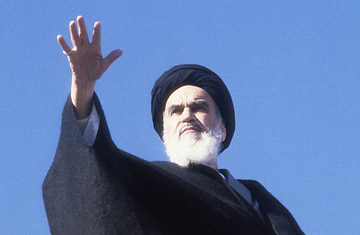
(5 of 8)
Meanwhile, other even more mysterious forces inside Iran were stirring up trouble. Several news agencies received warnings from a group calling itself the "Commando Organization of the Warriors of the Constitution." They threatened "guerrilla warfare" and "unprecedented slaughter" if the 1906 royalist constitution were overturned. These self-styled warriors also threatened to assassinate anyone who joined the Ayatullah's revolutionary council. Khomeini loyalists charged that provocateurs—suspected of being either agents of SAVAK or underground Communists, who have the most to gain from chaos—were inciting violence. Gangs of street toughs burned down a beer factory, a nightclub, and numerous slum dwellings in the city's red-light district. The apparent motive was to make the revolutionary movement seem fanatical and violent.
Despite unconfirmed reports that Iran was being flooded with weapons, including some purportedly provided by the Palestine Liberation Organization, pro-Khomeini demonstrations have been remarkably peaceful and well disciplined. Only on occasion have crowds gotten out of control of the street marshals provided by Khomeini's amoeba-like organization. In one particularly grim example last week, a mob at the University of Tehran grabbed General Tagi Latifi, a police officer, from his car, screaming, "Kill him!" He was beaten senseless before being rescued by a group of clergymen.
Such incidents have alarmed Iran's minorities, especially its 80,000-member Jewish community—one of the oldest in the Middle East—and 250,000 Christian Armenians. Although there have been no overt signs of antiSemitism, the Ayatullah's known antipathy to Zionism and Israel raises fears among Jewish families that there could be a repetition of the purges that took place in Egypt and Iraq after 1948. Khomeini has repeatedly assured Iran's minorities that their rights will be protected. Last month he sent a large floral wreath to the new "Hagh Horn," the leader of the Jewish community, with a note of assurance: "We are brothers living next to each other. It is only the government which tries to confuse everything." Nonetheless, an estimated 5,000 Jews have left the country, most for the U.S. and Europe.
They were not alone. Alarmed by what the State Department called the "uncertain security situation," and fearing a tide of anti-American sentiment, Ambassador William Sullivan asked Americans whose presence was not essential to leave. Despite many Iranians' personal reassurances to foreigners of their friendship, there were two ugly incidents: Major Larry Davis was hit by two bullets as he returned home, and was rushed to the U.S. Army hospital; U.S. Consul David McGaffey was punched and beaten by an irate group of Iranians when he tried to intervene in an incident between an American and a taxi driver. By week's end, all but 5,000 of the 45,000 Americans who had lived in Iran up until September were gone. U.S. officials say that the American business community is cutting back to the bare minimum that can sustain their corporate operations.
